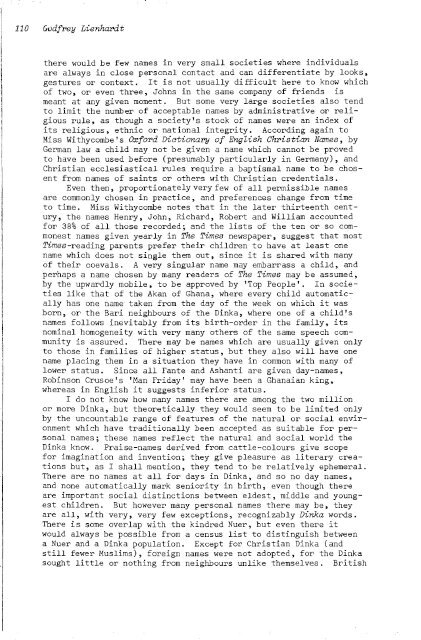CONTENTS NO.I - Institute of Social and Cultural Anthropology ...
CONTENTS NO.I - Institute of Social and Cultural Anthropology ...
CONTENTS NO.I - Institute of Social and Cultural Anthropology ...
You also want an ePaper? Increase the reach of your titles
YUMPU automatically turns print PDFs into web optimized ePapers that Google loves.
110 Godfrey Lienhardt<br />
there would be few names in very small societies where individuals<br />
are always in close personal contact <strong>and</strong> can differentiate by looks,<br />
gestures or context. It is not usually difficult here to know which<br />
<strong>of</strong> two, or even three, Johns in the same company <strong>of</strong> friends is<br />
meant at any given moment. But some very large societies also tend<br />
to limit the number <strong>of</strong> acceptable names by administrative or religious<br />
rule, as though a society's stock <strong>of</strong> names were an index <strong>of</strong><br />
its religious, ethnic or national integrity. According again to<br />
Miss Withycombe's Oxford Dictionary <strong>of</strong> English Christian Names, by<br />
German law a child may not be given a name which cannot be proved<br />
to have been used before (presumably particularly in Germany), <strong>and</strong><br />
Christian ecclesiastical rules require a baptismal name to be chosent<br />
from names <strong>of</strong> saints or others with Christian credentials.<br />
Even then, proportionately few <strong>of</strong> all permissible names<br />
are commonly chosen in practice, <strong>and</strong> preferences change from time<br />
to time. Miss Withycombe notes that in the later thirteenth century,<br />
the names Henry, John, Richard, Robert <strong>and</strong> William accounted<br />
for 38% <strong>of</strong> all those recorded; <strong>and</strong> the lists <strong>of</strong> the ten or so commonest<br />
names given yearly in The Times newspaper, suggest that most<br />
Times-reading parents prefer their children to have at least one<br />
name which does not single them out, since it is shared with many<br />
<strong>of</strong> their coevals. A very singular name may embarrass a child, <strong>and</strong><br />
perhaps a name chosen by many readers <strong>of</strong> The Times may be assumed,<br />
the upwardly mobile, to be approved by' People'. In socielike<br />
that <strong>of</strong> the Akan <strong>of</strong> Ghana, where every child automatically<br />
has one name taken from the day <strong>of</strong> the week on which it was<br />
born, or the Bari neighbours <strong>of</strong> the Dinka, where one <strong>of</strong> a child's<br />
names follows inevitably from its birth-order in the family, its<br />
nominal homogeneity with very many others <strong>of</strong> the same speech community<br />
is assured. There may be names which are usually given only<br />
to those in families <strong>of</strong> higher status, but they also will have one<br />
name placing them in a situation they have in common with many <strong>of</strong><br />
lower status. Since all Fante <strong>and</strong> Ashanti are given day-names,<br />
Robinson Crusoe's 'Man Friday' may have been a Ghanaian<br />
whereas in English it suggests inferior status.<br />
I do not know how many names there are among the two million<br />
or more Dinka, but theoretically would seem to be limited only<br />
by the uncountable range <strong>of</strong> features <strong>of</strong> the natural or social environment<br />
which have traditionally been accepted as suitable for personal<br />
names; these names reflect the natural <strong>and</strong> social world the<br />
Dinka know. Praise-names derived from cattle-colours give scope<br />
for imagination <strong>and</strong> invention; give pleasure as literary creations<br />
but, as I shall mention, they tend to be relatively ephemeral.<br />
There are no names at all for days in Dinka, <strong>and</strong> so no day names,<br />
<strong>and</strong> none automatically mark seniority in birth, even though there<br />
are important social distinctions between eldest, middle <strong>and</strong> youngest<br />
children. But however many personal names there may be, they<br />
are all, with very, very few exceptions, recognizably Dinka words.<br />
There is some overlap with the kindred Nuer, but even there it<br />
would always be possible from a census list to distinguish between<br />
a Nuer <strong>and</strong> a Dinka population. for Christian Dinka (<strong>and</strong><br />
still fewer Muslims), foreign names were not adopted, for the Dinka<br />
sought little or nothing from neighbours unlike themselves. British

















